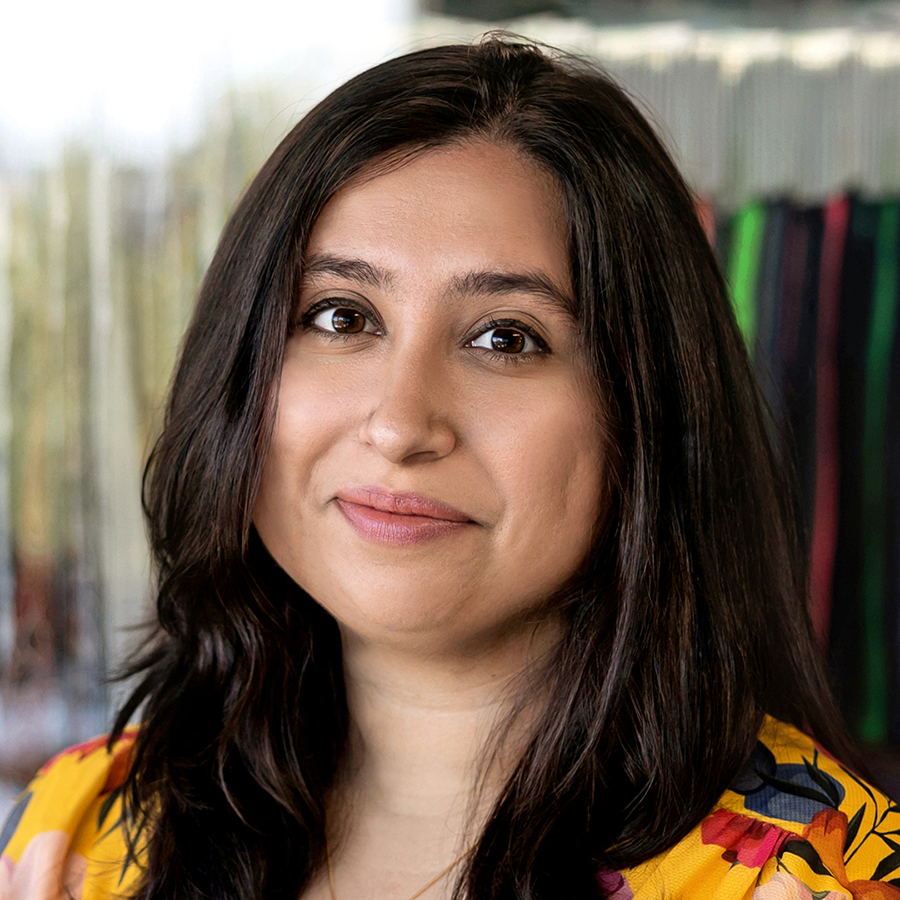
Tartans on the Rise
By Elizabeth Speed
Media InquiriesTartans on the Rise celebrates recent alumni who are making an impact in their organizations and in their communities, across the nation and around the world through leadership, innovation and career achievements.
Sarika Bajaj, Co-founder and Chief Executive Officer, Refiberd
Leading the Textile Recycling Charge
The ultimate destination of what you’re wearing — as well as 186 billion pounds of fabric annually — is most likely a landfill.
A sobering thought, but most of today’s fabrics are varying mixes of materials composed of natural and synthetic fibers and chemical dyes, which makes them difficult to recycle.
For alumni Refiberd founders Sarika Bajaj (ENG 2018, 2019; CMU 2020) and fellow Tartan on the Rise Tushita Gupta (ENG 2018, 2018), it’s an opportunity to make a global impact.
“Whenever you want to recycle something, you need to know the composition of the material you're recycling. With textiles, the material detection problem is challenging,” says Sarika, the company’s chief executive officer. “We’re trying to make that detection easier to lower fabric’s impact in the world.”
A problem as challenging as this one requires an entrepreneurial approach. Sarika brings that mindset and leadership skills to the startup along with a strong technical foundation.
At CMU, Sarika earned master’s degrees in technology ventures and electrical and computer engineering as well as a student-defined bachelor’s degree in product ideation, prototyping and development.
During an internship with Intel, she worked on wearable biosensing prototypes, her introduction to textiles through the lens of design and engineering. Through her participation in IDeATe and the Integrated Innovation Institute, Sarika continued her research in the world of textile engineering where she became acutely aware of material challenges with textile recycling.
Sarika and Tushita had been friends since their undergraduate years and co-founded Refiberd, mixing their interdisciplinary backgrounds of engineering, machine learning and textiles.
It was an idea built on social impact, and it’s working. In 2023, Refiberd was recognized with the Global Change Award from the H&M Foundation, honoring early-stage innovations that help the fashion and textile industry protect Earth’s resources. The company is attracting investment and talent to expand their capabilities to address the textile waste problem.
“The first goal is to reduce textile waste,” says Sarika. “The next goal is seeing how we can help other recyclers in other industries.”
Tushita Gupta, Co-founder and Chief Technology Officer, Refiberd
Innovating Textile Recycling with AI
What’s your current outfit made from? Most of us don’t really know, and the options for combining natural and synthetic fibers are nearly endless.
Because many of those mixed textiles are hard to recycle, they’re a sizable portion of the 186 billion pounds of fabric filling landfills each year.
For alumni Tushita Gupta (ENG 2018, 2018) and fellow Tartan on the Rise Sarika Bajaj (ENG 2018, 2019; CMU 2020), it’s a looming crisis that AI can help to mitigate.
The two CMU alumni co-founded Refiberd, a seed-stage company that has developed an AI-based technology to sort waste for textile-to-textile recycling.
“Other fields use intelligent material detection, but applying it to textiles is a huge opportunity,” says Tushita, the company’s chief technology officer. “No scaled solutions exist for textile waste detection for recycling, because it's such a hard problem.”
Tushita has long been interested in AI and its potential. While pursuing her master’s degree in electrical and computer engineering and a bachelor’s degree in electrical and computer engineering and biomedical engineering at CMU, her capstone focused on intelligent trash-sorting.
Tushita’s friend from her first days at CMU, Sarika saw the potential to combine their backgrounds in machine learning, textiles, and engineering and Refiberd was born.
Refiberd’s innovation uses a hyperspectral camera combined with AI to detect fiber composition and sort textile waste for recycling. The camera identifies fibers by how they absorb or reflect light. AI processes each material’s unique signature to discern fabric composition and groups similar materials for reuse.
In 2023, Refiberd was recognized with the Global Change Award from the H&M Foundation, honoring early-stage innovations that help the fashion and textile industry protect Earth’s resources.
“We aim to have Refiberd be the solution that closes the loop for textile circularity,” she says. “I’ve always been driven by impact, and I believe it’s our responsibility to protect the resources we have.”


